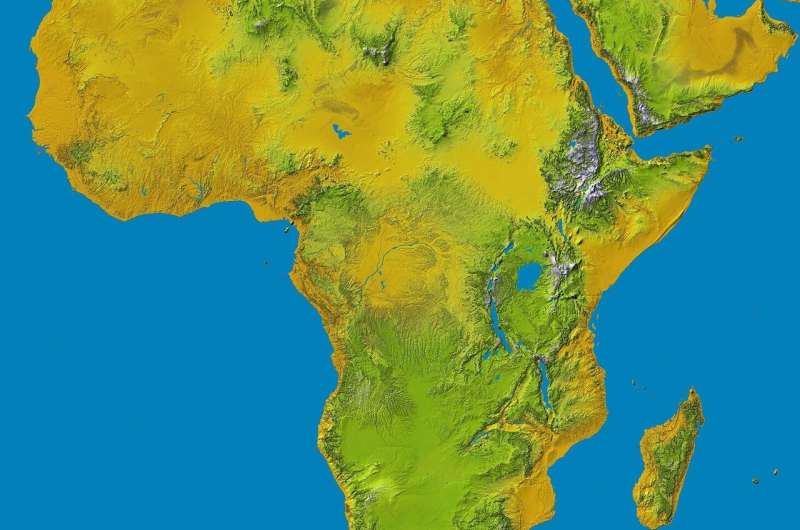This article has been reviewed according to Science X's editorial process and policies. Editors have highlighted the following attributes while ensuring the content's credibility:
fact-checked
trusted source
proofread
Focus on people to boost Africa's climate resilience, says report

Investments in Africa's infrastructure can make people and communities far more resilient to the threats posed by climate change, a new report says.
Traditionally, financiers and developers have focused on risks to infrastructure such as transport, water and energy systems when considering climate resilience (being able to cope with threats such as extreme heat and storms).
However, a new report launched at COP28—produced by the Private Infrastructure Development Group (PIDG) and the University of Exeter—calls for an expanded focus.
Specifically, it says financiers and developers should consider how infrastructure can most effectively contribute to the resilience of the communities and economies it serves—especially those most vulnerable to climate extremes.
Professor Richard Betts MBE, a lead author of the report, said, "Climate hazards such as extreme heat and humidity, drought, heavy rainfall and sea-level rise are increasingly seen across many parts of Africa, and will be more widespread and more severe in the coming decades.
"Millions of people in Africa are more vulnerable to these threats because they lack access to critical power, transport and water services, or rely on aging, overstretched or informal infrastructure."
The report outlines the varying climate threats facing different African regions.
While much of the continent will experience increasing heat stress, some areas will be particularly prone to droughts (e.g. North Africa, Southern Africa and areas of the Sahara), while others are more likely to experience heavy rainfall and flooding (e.g. East Africa, Central and West Africa), and others may be hit by both (e.g. Madagascar).
Coastal flooding and wildfires are also likely to increase in some areas.
Given these growing threats, the report urges investors to gain a better understanding of which vulnerabilities need to be addressed, and therefore which kinds of investment can be the most powerful in building resilience.
Anna Murphy, the other lead author, said, "When considering infrastructure investments for climate resilience, the focus needs to be on the people who use it.
"The most inspiring and effective solutions focus on people, yet tackle multiple issues simultaneously.
"I spoke with entrepreneurs building affordable solar-powered irrigation systems which improve crop yields even in drought and bring clean power to communities—and therefore provide a cascade of education, information and economic opportunities.
"Multipurpose roads can be designed to mitigate flood risk and store water for use in drought periods.
"Or sewage sludge can be converted from a health risk exacerbated by flooding, into fuel, reducing business emissions and costs as well as deforestation—and solving a health risk.
"Entrepreneurs developed these solutions by working closely with their users.
"They show how determined and creative problem-solving are identifying win-win-win solutions for climate resilience local livelihoods, wider economies and the planet."
The report says climate resilience and sustainable development can be mutually beneficial.
Considered together, they can trigger processes of change that widen and accelerate—going beyond incremental change to transform lives and ensure African economies continue to develop and grow in the face of climate hazards.
"The challenge for investors is to use resources strategically to maximize climate-resilient development," said Tom Powell, another key author.
"By doing this, investment can drive processes and outcomes which can endure, self-sustain and cascade, even in the face of climate change.
"Such opportunities exist.
"In contrast to some other regions, Africa's great need for new infrastructure creates the opportunity to leapfrog to an integrated approach which delivers on sustainability, adaptation and resilience.
"Africa's young, educated and entrepreneurial population is developing and scaling solutions which deliver development, adaptation and resilience simultaneously."
The report highlights nature-based "green infrastructure" solutions, which have huge potential in some settings given their effectiveness in delivering resilience, adaptation and development—while being typically cheaper than conventional hard infrastructure solutions.
Infrastructure can drive climate-resilience and development through providing direct adaptation or resilience benefits that protect from climate hazards; through driving economic development that underpins people's capacity and resources to adapt; and through contributing to macro-economic resilience by facilitating trade or reducing dependence on imports.
"Infrastructure financing at scale and pace in developing and emerging markets is crucial to climate resilience and sustainable development where these challenges are most urgent," said Philippe Valahu, from PIDG.
"Our report identifies the hazards and opportunities—and aims to redefine what investing in climate action means in Africa, opening new avenues for investors and helping them make decisions that enable and accelerate climate-resilient development."
The report is titled, "Africa Climate Solutions: Investing in infrastructure for climate resilience across Africa."
Provided by University of Exeter





















